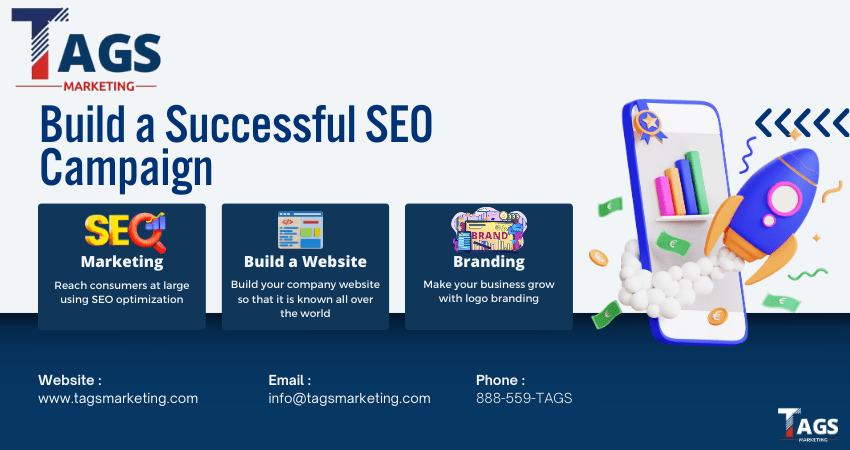How to Build a Successful SEO Campaign
In the ever-evolving digital landscape, Search Engine Optimization (SEO) services remains a crucial element of any successful online marketing strategy. A well-planned and executed SEO campaign can significantly increase your website’s visibility, drive organic traffic, and boost your online presence. However, building a successful SEO campaign is not a one-size-fits-all endeavor.
It requires careful planning, continuous effort, and adaptability to changing search engine algorithms. This article will guide you through the steps to build a successful SEO campaign.
Define Your Goals and Objectives in SEO Campaign
Before diving into any SEO campaign, defining clear goals and objectives is essential. What do you want to achieve with your SEO efforts? Common goals include increasing organic traffic, improving search engine rankings, and boosting online sales. By establishing specific, measurable, achievable, relevant, and time-bound (SMART) goals, you’ll have a clear roadmap for your campaign’s success.

Conduct Comprehensive Keyword Research
Keyword research is the foundation of any successful SEO campaign. It involves identifying the keywords and phrases your target audience uses to search for products or services related to your business. Use keyword research tools like Google Keyword Planner, SEMrush, or Ahrefs to discover relevant keywords with high search volumes and reasonable competition.
Focus on long-tail keywords, which can be less competitive and yield more targeted traffic.
Analyze Your Competitors
Competitor analysis is a vital aspect of SEO campaign planning. Identify who your main competitors are and analyze their online presence. Look at the keywords they are ranking for, the quality and quantity of their backlinks, and their content strategies. This analysis can provide valuable insights into your niche and help you discover opportunities to outperform your competition.
On-Page Optimization SEO Campaign
On-page optimization involves changing your website to improve its search engine visibility.
Here are some key on-page SEO elements to focus on:
- Title Tags and Meta Descriptions: Optimize these elements for relevant keywords and ensure they are compelling to encourage click-through from search engine results pages (SERPs).
- High-Quality Content: Create informative, valuable, and engaging content that addresses the needs of your target audience. Regularly update your content to keep it fresh and relevant.
- URL Structure: Use clean and descriptive URLs incorporating your target keywords.
- Header Tags: Utilize header tags (H1, H2, H3, etc.) to structure your content and improve readability.
- Mobile Optimization: Ensure your website is mobile-friendly, as mobile-friendliness is a significant ranking factor.
- Page Speed: Optimize your site’s loading speed, as faster websites rank higher in search results.
Off-Page Optimization
Off-page optimization involves activities outside your website that can impact your search engine rankings.
Critical components of off-page SEO include:
- Link Building: Acquire high-quality, relevant backlinks from reputable websites. These backlinks can significantly boost your site’s authority and trustworthiness in the eyes of search engines.
- Social Signals: Engage with your audience on social media platforms, as social signals can influence search engine rankings.
- Online Reputation Management: Monitor and manage your online reputation, as customer reviews and online mentions can impact your brand’s visibility and trustworthiness.
Technical SEO
Technical SEO focuses on the behind-the-scenes elements of your website that impact its search engine performance.
This includes:
- Website Architecture: Ensure your website’s structure is user-friendly and easily navigable, with clear site maps.
- XML Sitemaps: Create and submit XML sitemaps to search engines to help them crawl and index your pages more efficiently.
- Site Speed and Mobile Optimization: Continuously monitor and optimize your site’s speed and mobile-friendliness.
- Canonical Tags: Use canonical tags to indicate the preferred version of duplicate content, preventing issues with search engine ranking.
- SSL Security: Secure your website with an SSL certificate to ensure a safe browsing experience for visitors.
Content Marketing
Content marketing is an integral part of SEO. It involves creating and promoting valuable content to attract and engage your target audience. Content can include blog posts, articles, videos, info graphics, and more.
Develop a content calendar and create high-quality, informative content that addresses the needs and questions of your target audience. Promote your content through various channels, such as social media, email marketing, and influencer outreach, to expand your reach and increase backlinks.
For businesses with a physical presence, local SEO is essential. Ensure your business information is accurate and consistent across online directories, including Google My Business. Encourage customer reviews and ratings, which can significantly impact your local search rankings.
Local SEO (if applicable)
Continuous monitoring and analysis are vital to the success of your SEO campaign. Use tools like Google Analytics and Google Search Console to track your website’s performance. Monitor keyword rankings, organic traffic, click-through, and conversion rates. Regularly assess the effectiveness of your strategies and make adjustments as needed.
Adapt to Algorithm Changes
Search engines frequently update their algorithms. Stay informed about these changes and adapt your SEO strategies accordingly. What worked yesterday may not work tomorrow. Maintaining online visibility is crucial to staying up-to-date with industry news and best practices.

Conclusion
Building a successful SEO campaign is a multifaceted process that requires careful planning, execution, and continuous adaptation. By defining clear goals, conducting thorough research, optimizing on-page and off-page elements, and consistently creating high-quality content, you can increase your website’s visibility, drive organic traffic, and ultimately achieve your online marketing objectives.
Remember that SEO is an ongoing process; staying informed about industry developments is essential to long-term success.
